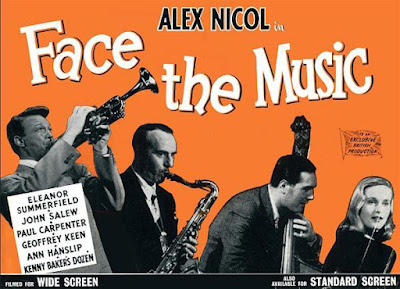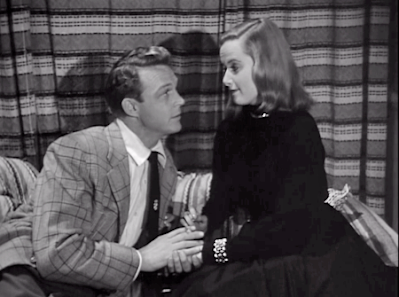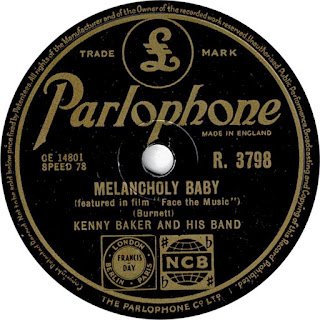I’m willing to bet that no other film has turned a jazz trumpet player into an amateur sleuth.
During the decade before the innovatively gruesome Curse of Frankenstein (1957) and Dracula (1958) prompted Britain’s Hammer Films to embrace horror and science fiction more aggressively, the studio was better known for a string of crime, detective and film noir thrillers. Most were modest, bottom-of-the-bill programmers, such as The Rossiter Case (1951), Stolen Face (1952) and The Glass Cage (1955), although the roster also included popular serial character entries such as Dick Barton: Special Agent (1948), Whispering Smith Hits London (1951) and even The Saint’s Return (1953).
1954’s Face the Music is an early effort by indefatigable director Terrence Fisher — he helmed 15 movies between 1952 and ’54! — a few years before he became better known for gory revivals of vampires, werewolves, ancient mummies and Frankenstein’s monster. German crime writer Ernest Bornemann adapted this modest thriller from his book of the same title, published the same year. His unusual choice of sleuth is perhaps better understood given Bornemann’s wide-ranging talents; he also was a jazz musician and critic who clearly influenced this film’s wall-to-wall jazz soundtrack. Covers of jazz standards are interlaced with original themes by prolific English composer/conductor Ivor Slaney and celebrated English composer and jazz trumpet, cornet and flugelhorn player Kenny Baker; the latter gets a second screen credit, for “trumpet theme and special arrangements.” Most of the music is diegetic — live performances in concert halls and basement clubs — but jazz cues also creep into the nondiegetic score, most often when our protagonist, in true film noir fashion, supplies background detail and mordant commentary via world-weary voiceovers.
A shrill solo trumpet highlights the swinging main theme, heard over the title credits cards; the music continues, uninterrupted, as the final credit (for Fisher) segues to a sold-out Palladium performance by a 15-piece big band and its featured guest star: renowned American trumpeter James “Brad” Bradley (Alec Nicol). Baker “ghosts” all of Brad’s performances throughout the film, and this Palladium band is dominated by members of Kenny Baker’s Dozen, including Harry Klein, baritone sax; Stan Tracey, piano; Joe Mudell, acoustic double bass; and Don Lawson, drums.
Brad’s schedule apparently has been punishing. After the performance concludes to thunderous applause, he skips a party organized by his long-suffering manager, Max “Maxie” Margulies (John Salew, overdoing flustered exasperation), intending instead to get a good night’s sleep in his hotel room. But when his cab pauses at an intersection, Brad is distracted by a lovely jazz vocal emanating from a nearby cellar club. Unable to help himself, he dismisses the cab and enters the club, where he finds chanteuse Maxine Halbard (Ann Hanslip) crooning Howard Biggs and Joe Thomas’ “Got You On My Mind,” backed by a sextet that includes Klein and Michael Carreras, trumpet. Brad is so enchanted that he whips out his own trumpet, and begins counterpoint comping behind Maxine’s vocal. She smiles in approval.
Once Maxine’s set concludes, they return to her flat. She putters in the kitchen while Brad finds a big band tune on her radio; they then indulge in some flirty word play (definitely the script’s finest moment). Alas, the banter is wasted; Maxine confesses that she has a Canadian boyfriend, at which point Brad honorably departs … while forgetting his trumpet, left behind on the floor, in its case. (Like that would ever happen in real life? No musician would be that sloppy with his prized instrument!)
Finally back in his hotel room, Brad wakes the following morning under the disapproving gaze of Detective Inspector MacKenzie (Fred Johnson) and Detective Sergeant Mulrooney (Martin Boddey). Maxine has been murdered by an unknown party, and Brad’s overlooked trumpet case makes him Suspect No. 1. Following a mild interrogation, MacKenzie nonetheless allows Brad to roam at will, much to Mulrooney’s obvious displeasure. A chance clue leads Brad to a rough Soho cellar club dubbed Underground — “The sort of place you leave horizontally, or not at all,” he muses, in voiceover — where he finds Barbara Quigley (Eleanor Summerfield) crooning “Nobody Knows the Trouble I’ve Seen,” backed by solo pianist Johnny Sutherland (Paul Carpenter). Brad foolishly provokes a fist fight; Barbara saves him from even worse treatment by the club’s numerous seedy customers. He then learns that she’s actually Maxine’s sister.
Maxine’s murder isn’t the only mystery. Brad soon realizes that the case somehow revolves around a vinyl Gramo Disc single on which she sings Josephine Parker’s “I Got a Man in New Orleans,” backed by — according to the label — pianist Jeff Colt (Arthur Lane). Rather oddly, only two copies were pressed; even stranger, everybody — Sutherland, Colt, and Gramo owner Maurie Green (Geoffrey Keen) — insists that Maxine and Colt never worked together.
Brad’s subsequent sleuthing involves a clandestine search of Sutherland’s flat, backed by a mournful trumpet cue; a later after-hours club scene finds Sutherland jamming as part of a sax and drum trio. In between other activities, alone in his hotel room or Palladium dressing room, Brad puzzles out details while pensively playing his trumpet. The eventual breakthrough relies on his sharp-eared ability to recognize a jazz pianist who plays cross-handed (certainly the only time that has been a key clue in a murder mystery!).
Brad ultimately drags the two detectives and all the suspects into his dressing room, for an Agatha Christie-style, point-by-point recitation that ultimately reveals the killer … just in time for him to join the band on the Palladium stage for that evening’s performance, much to the delight of another packed house that has been chafing over his delayed arrival. Fade to black.
In another example of Hollywood’s then-insufferable — and often bewildering — habit of re-titling British films for American release, Face the Music hit U.S. theaters as The Black Glove … despite the fact that no black glove ever appears in the story.
No soundtrack album was produced, then or now, although two tunes featured in the film — “Melancholy Baby” and “Trumpet Fantasy” — were released by the British Parlophone label as a 1954 10-inch 78RPM single.




No comments:
Post a Comment